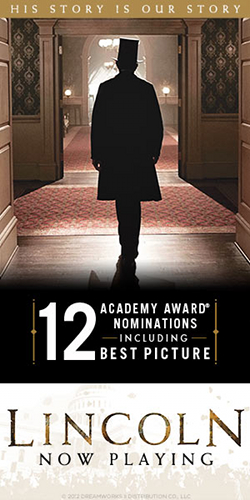Subversive Saturday: Modern Times (1936)
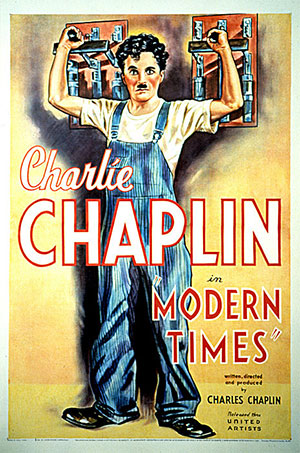 Cast: Charles Chaplin, Paulette Goddard, Henry Bergman
Cast: Charles Chaplin, Paulette Goddard, Henry Bergman
Director: Charles Chaplin
Country: USA
Genre: Comedy | Drama
Watch It: Here
The following review is a continuation of Matthew Blevins’ Subversive Saturdays series.
The problem with a subversive idea is that it requires a vessel with which to present its case to an amenable audience. Even with the near universal accessibility of the films featured in this column via YouTube and other methods well-known to the savvy, many of the titles go unseen, even by those that would consider themselves film aficionados. Those that are capable of reading the subtext of such material, understand the importance of the message, and possess a cursory knowledge of the context of the world that generated such ideas will already have certain openness to unusual ideas and appreciate the necessary and unnecessary hypocrisies that drive the world in which we live. Most folks just want to get through their daily lives with a certain degree of peace, not necessarily lacking in empathy but generally unconcerned with the issues of others outside of their social spheres. Subversive art shows the ideas of the marginalized, positing ideals outside of the confines of good taste and societal norms, but how does an artist create work that delivers controversial messages to the masses?
He maintained a sensitivity to the issues of the world despite his successes, and Modern Times expresses this camaraderie with the common man as he dealt with issues that were very real in a post-industrialist world of increasing dehumanization in a world driven by production.
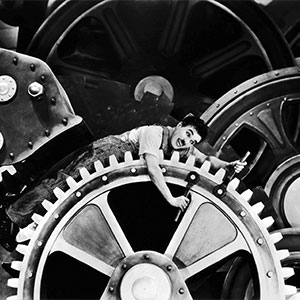 Charles Chaplin delivered subversive messages with the inherent innocence of his legendary tramp, showing the unfair conditions of the time while making audiences laugh. He was ultimately punished for his misdeeds; harboring political leanings too humanist for our government’s comfort and his incessant exposing of controversial truths would ultimately lead to a passive aggressive de facto deportation, disallowed to reenter the United States after a trip overseas. Despite these unfortunate events, there was a time when Chaplin was a subversive artist that accomplished the impossible task of becoming the number one artist of his time, beloved by all but always beholden to his ideals forged from an upbringing of poverty and tragedy. He maintained a sensitivity to the issues of the world despite his successes, and Modern Times expresses this camaraderie with the common man as he dealt with issues that were very real in a post-industrialist world of increasing dehumanization in a world driven by production. Assembly lines created job opportunities, but at great cost as man was never meant to spend hours repeating the same motions, leading to mental breakdowns and lifelong physical issues.
Charles Chaplin delivered subversive messages with the inherent innocence of his legendary tramp, showing the unfair conditions of the time while making audiences laugh. He was ultimately punished for his misdeeds; harboring political leanings too humanist for our government’s comfort and his incessant exposing of controversial truths would ultimately lead to a passive aggressive de facto deportation, disallowed to reenter the United States after a trip overseas. Despite these unfortunate events, there was a time when Chaplin was a subversive artist that accomplished the impossible task of becoming the number one artist of his time, beloved by all but always beholden to his ideals forged from an upbringing of poverty and tragedy. He maintained a sensitivity to the issues of the world despite his successes, and Modern Times expresses this camaraderie with the common man as he dealt with issues that were very real in a post-industrialist world of increasing dehumanization in a world driven by production. Assembly lines created job opportunities, but at great cost as man was never meant to spend hours repeating the same motions, leading to mental breakdowns and lifelong physical issues.
…the visual is striking as Chaplin himself becomes an involuntary world leader as representative for the plight of the common man.
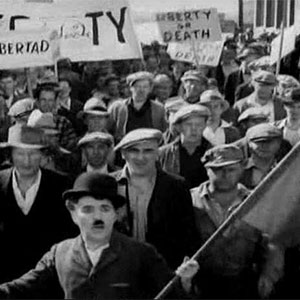 In Modern Times, Chaplin’s beloved tramp goes through a slightly exaggerated version of such factory work, exposing contemporary issues to mass audiences through his brilliant comedy and understanding and geniune concern for the issues of the “common man”. In a factory inspired by Fritz Lang’s Metropolis, his tramp is under constant pressure from his omnipotent Henry Ford/Joh Fredersen-esque boss who can reprimand even from the confines of a bathroom, ensuring that no diversions from productivity will impact the sacrosanct bottom line. Even meals create unnecessary pauses in productivity, so they test new automated feeding equipment on the tramp, but a few design mishaps create wonderful humor, inoffensive through its exaggerations and universally accessible in its brilliance but subversive in its implications of the dehumanization of man for the benefit of the behemoth monster of commerce.
In Modern Times, Chaplin’s beloved tramp goes through a slightly exaggerated version of such factory work, exposing contemporary issues to mass audiences through his brilliant comedy and understanding and geniune concern for the issues of the “common man”. In a factory inspired by Fritz Lang’s Metropolis, his tramp is under constant pressure from his omnipotent Henry Ford/Joh Fredersen-esque boss who can reprimand even from the confines of a bathroom, ensuring that no diversions from productivity will impact the sacrosanct bottom line. Even meals create unnecessary pauses in productivity, so they test new automated feeding equipment on the tramp, but a few design mishaps create wonderful humor, inoffensive through its exaggerations and universally accessible in its brilliance but subversive in its implications of the dehumanization of man for the benefit of the behemoth monster of commerce.
The tramp would eventually become caught in the gears of the post-industrial world, creating one of cinema’s most iconic scenes as his character compulsively tightens bolts, likely unaware of his precarious and life-threatening situation as he loses his sanity in the insanity of his environment. Still driven by a compulsory desire to tighten bolts (or buttons on women’s dresses bearing a vague resemblance to bolts in his delirious state), he heads to the streets, escaping the machinery of industry but at the cost of his sanity and self sufficiency.
As Chaplin and his Gamin depart down the empty road toward an uncertain future, we are reassured by their love as they are most likely headed toward more hardship in a world unsuited for lovers, poets, and humanists.
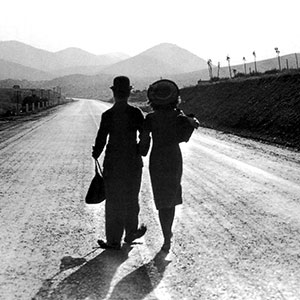 An innocent act of politeness as he tries to return a flag that has fallen off of a truck puts him in the unlikely position of the leader of a group on men on strike, espousing a socialist message innocently as his inconspicuous deed makes his character unwitting, but the visual is striking as Chaplin himself becomes an involuntary world leader as representative for the plight of the common man. It is a role he assumes reluctantly, but his need to create art that remained true to his humanist vision and ability to incite laughter universally ensured that this vision would be seen around the world. Even his reluctance to adapt to sound cinema wouldn’t hinder the accessibility of the film’s message, but granted it universality that would allow it to be seen be large audiences around the world.
An innocent act of politeness as he tries to return a flag that has fallen off of a truck puts him in the unlikely position of the leader of a group on men on strike, espousing a socialist message innocently as his inconspicuous deed makes his character unwitting, but the visual is striking as Chaplin himself becomes an involuntary world leader as representative for the plight of the common man. It is a role he assumes reluctantly, but his need to create art that remained true to his humanist vision and ability to incite laughter universally ensured that this vision would be seen around the world. Even his reluctance to adapt to sound cinema wouldn’t hinder the accessibility of the film’s message, but granted it universality that would allow it to be seen be large audiences around the world.
Despite the undercurrent of political frustration that ran throughout Chaplin’s body of work, the comedic elements meld with touching scenes of love between Chaplin and his Gamin. The issues of the world are secondary to the connection between two people, as illogically the love of the world is merely a whisper when compared to our screaming desire to find that one person that we can share our lives with. As Chaplin and his Gamin depart down the empty road toward an uncertain future, we are reassured by their love as they are most likely headed toward more hardship in a world unsuited for lovers, poets, and humanists. In Modern Times Chaplin expresses the romantic idea that if have someone to share our misfortune and joys with we will ultimately endure and hopefully work toward building a more humane world, where the misfortune of others is deemed more important than the benefit of industry and production.
-
http://twitter.com/Bryan_C_Murray Bryan Murray









 This Week on Demand: The Best of Youth
This Week on Demand: The Best of Youth Review: Identity Thief (2013)
Review: Identity Thief (2013) Review: Side Effects (2013)
Review: Side Effects (2013) Review: The Playroom (2012)
Review: The Playroom (2012) DVD Review: The Ballad of Narayama (1958)
DVD Review: The Ballad of Narayama (1958)
